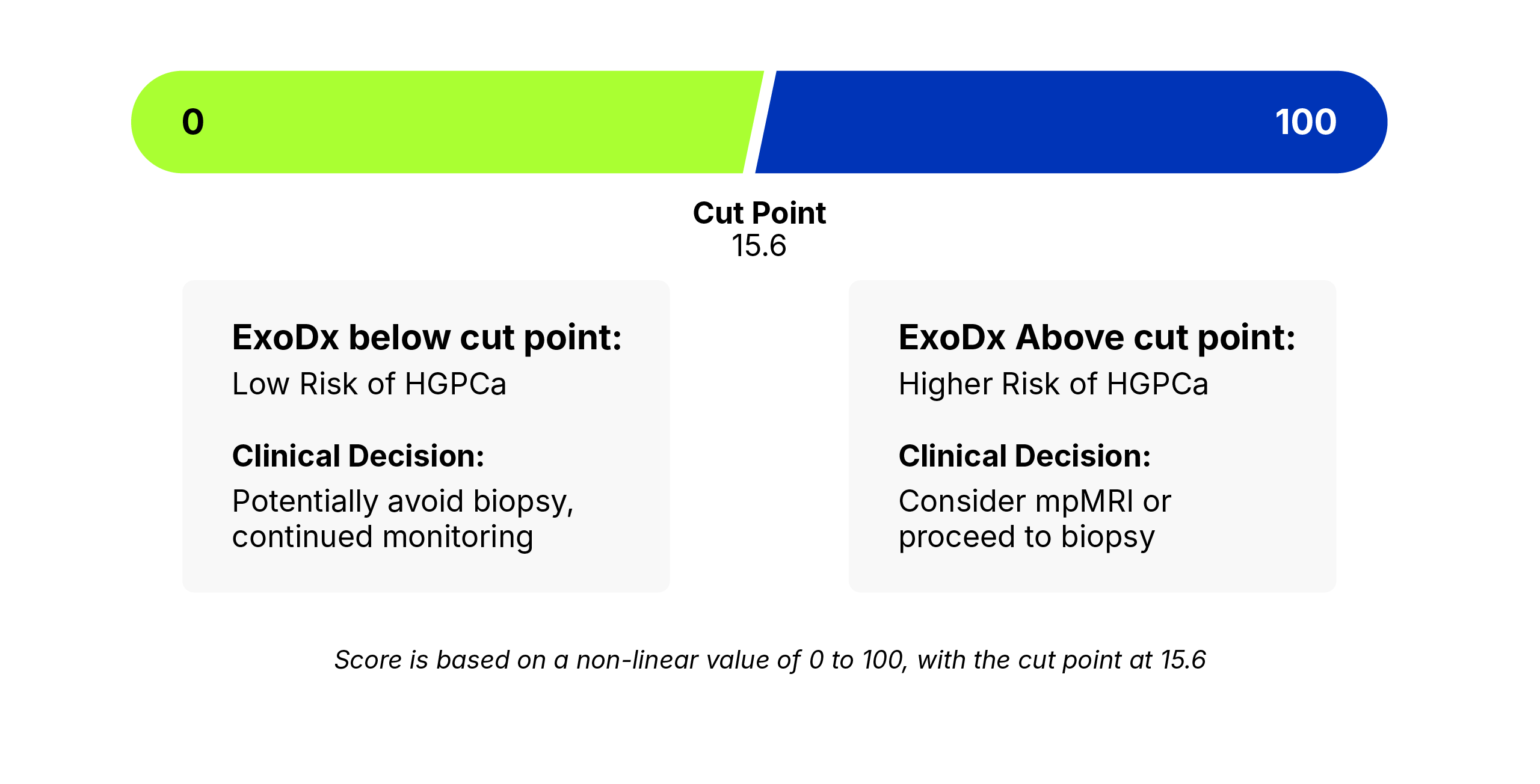What is the EPI-CE Test?
The EPI-CE test is a simple, non-invasive urine test to assess your risk of having clinically significant or high-grade prostate cancer. The EPI‑CE test does not require a digital rectal exam (DRE) and provides an individualized risk score that can help determine to whether to proceed or defer a prostate biopsy.

Are You:
- A man aged 50 or older?
- Have a prostate-specific antigen (PSA) level between 2 and 10 ng/mL?
- Have not yet had an MRI?
- Speaking with your doctor or concerned about an initial or repeat prostate biopsy?
If yes, The EPI-CE Test may be right for you.

What are the benefits of the ExoDx Prostate IntelliScore (EPI CE-IVD)?
The EPI-CE test provides a risk assessment for finding clinically significant prostate cancer that otherwise relies on biopsy in men with an elevated PSA. Right now, there just isn’t great information that can help doctors and patients screen for and diagnose prostate cancer without the over-reliance on prostate biopsies. The EPI-CE test provides a simple, painless, and accurate answer to inform the prostate biopsy decision. If the test result indicates that a “low risk”, then the man and his doctor (using all other clinical information including family history, prior PSA, abnormal DRE) may decide to defer prostate biopsy – avoiding the pain, complications and costs associated with a prostate biopsy.
Confidence and Peace of Mind
The EPI-CE Test can help inform the physician-patient prostate biopsy decision:
- Non-invasive, simple urine collection, can occur at any time of day
- Offers a risk score that informs the prostate biopsy decision
- Clinically proven in men age 50 or over, with PSA levels 2-10ng/mL, and considering an initial or repeat prostate biopsy and have not had an MRI
- The EPI-CE test is based on the well-established ExoDx Prostate Test which has successfully operated from the ExosomeDx CLIA facility in the U.S. since 2016.
- The U.S EPI test is included in the 2019 National Comprehensive Cancer Center Network Guidelines (NCCN) for early detection of prostate cancer

**The EPI-CE test is a simple, non-invasive urine test that provides valuable information for the biopsy decision.**
The EPI-CE Test works by analyzing prostate cancer-specific genomic biomarkers that are highly expressed during tumor cell growth found in the urine. These biomarkers are measured in a clinical laboratory and a validated algorithm calculates a score to determine a man’s risk of having aggressive or clinically significant prostate cancer.
| If your ExoDx IntelliScore is: | The Result Means This: | The intervention is this: |
|---|---|---|
| < 15.6 | Low risk or benign | Potentially avoid biopsy Continued monitoring |
| > 15.6 | Higher risk |
Consider MRI Proceed to biopsy |

Should I Get The EPI-CE Test?
If you are a man over the age of 50 with a prostate specific antigen (PSA) of 2-10 ng/mL, have not had an MRI and are considering a prostate biopsy, then you should talk to your doctor or health care provider about the EPI-CE test.
The EPI-CE test helps physicians and patients make critical decisions about whether or not to proceed to or defer prostate biopsy.
The EPI-CE test:
- Simple, non-invasive urine test
- Based on the U.S. EPI test which has been performed successfully for more than 60,000 men since 2016 in the ExosomeDx CLIA lab, and is included in the May 2019 NCCN guidelines
- Proven to avoid almost 34% of potentially unnecessary biopsies
Common Reasons for a Prostate Biopsy
A prostate biopsy is used to diagnose prostate cancer. Your doctor may recommend a prostate biopsy if any of these prostate cancer symptoms are present:
- Family history of prostate cancer
- Elevated or high PSA
- Increasing PSA over time
- Abnormal results from a digital rectal exam (DRE)
Know before you go: The EPI-CE test is a simple urine test that can inform if prostate biopsy is right for you.
Know Before You Go
Here are the top questions to take with you to your doctor’s office:
- How is prostate cancer detected?
- What is my PSA level and history of PSA levels?
- How accurate is the PSA in assessing my risk for high-grade prostate cancer?
- What is the chance of having a negative or undetermined result for prostate cancer if I have a prostate biopsy?
- What is the chance of having a positive result for prostate cancer if I have a prostate biopsy?
- What is the treatment plan if my prostate biopsy results in a “Low Grade” prostate cancer (Grade Group 1 or below)
- What are alternatives to a prostate biopsy for diagnosis of prostate cancer?
- Is there any risk to obtaining the EPI-CE test before the biopsy?
- Am I a candidate for the EPI-CE test?